hankyoreh
Links to other country sites 다른 나라 사이트 링크
The real reason for Yoon and Han’s politics of antagonism and hate
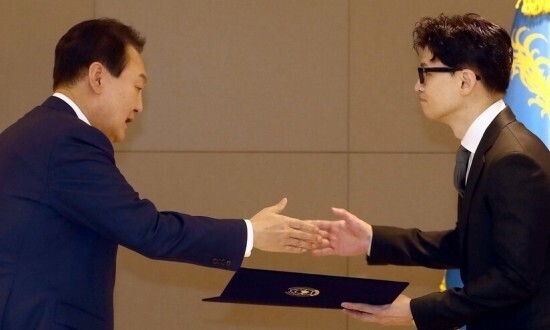
Yoon Suk-yeol spent a long time as a public prosecutor before becoming president of South Korea, but those in the know say he used to have little interest in ideology. But when he entered the political fray, he seemed to have adapted his personal philosophy to that of the “new right,” a segment of the Korean far right. It was on June 29, 2021, when Yoon announced that he would be running for president, that he first used the phrase “vested-interest cartel.”
“A small number of vested-interest cartels whose interests are linked to those of the political establishment have monopolized power and are building a food chain that paralyzes a sense of responsibility and ethics,” Yoon said at the time.
Since becoming president, Yoon has branded a series of groups as cartels, one after another: the new and renewable energy industry, the Korean Public Service and Transport Workers’ Union; the Korean Construction Workers’ Union; the Korean Confederation of Trade Unions; sections of the establishment that oppose reform initiatives in the areas of labor, pension and education; and educational bureaucrats who are supposedly in collusion with the private education market.
In a luncheon with newly appointed vice ministers on July 3, 2023, Yoon described his administration as being “anti-cartel” and instructed the new officials to “undertake a merciless fight against vested-interest cartels.”
Yoon’s next target was “anti-state groups that blindly follow communism and totalitarianism.” That came up in a celebratory speech on Aug. 15, the anniversary of Korea’s liberation from Japanese colonial rule.
“Still rampant are anti-state forces that blindly follow communist totalitarianism, distort public opinion, and disrupt society through manipulative propaganda. In a divided nation, the confrontation between liberal democracy and communist totalitarianism is a reality. And the activities of those anti-state groups are likely to persist,” Yoon said in the speech.
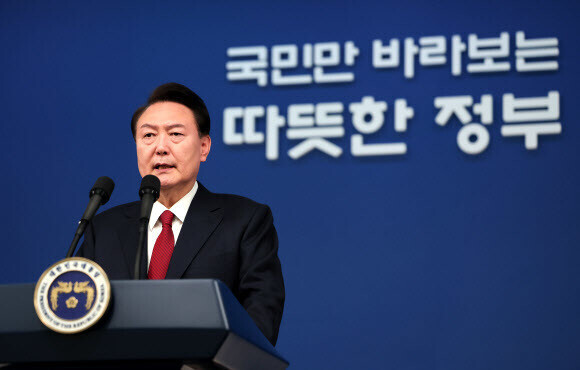
Yoon may have pressed his luck too far on this point. His far-right comments and actions culminated in a controversy over the removal of a bust of freedom fighter Hong Beom-do. Growing public opposition was accompanied by rising discomfort inside the Yoon administration.
In the Sept. 18 issue of the Joongang Ilbo, a daily newspaper, Editor-in-Chief Choe Hoon wrote a column titled “An ‘ideology war,’ a double-edged sword” in which he voiced criticism of Yoon’s ideologically charged remarks.
Choe’s column ended with the following remarks, which were prepared by the president himself, relayed by an aide: “[My] remarks about ideology are based on my desire for us to be more prosperous. That would be impossible unless the institutions of liberal democracy and market economy are absolutely clear. My ultimate intention was to clarify once more, both for domestic and foreign audiences, that the identity of the state is based on the public livelihood and sustainable development.”
In short, Yoon said that the public livelihood takes precedence over ideology. That was also an indication that he would put a stop to his far-right ideological actions.
The crushing defeat of the People Power Party’s candidate in a by-election for the mayor of Seoul’s Gangseo District on Oct. 11 likely added to this attitude. On Oct. 17, Yoon emphasized “unity” while attending an event organized by the Presidential Committee of National Cohesion. Then on Oct. 18, he said to his advisors, “The people are always right. We mustn’t make excuses, regardless of the criticism. We need to roll up our sleeves and do more for the public livelihood,” he said.
After that, Yoon’s remarks about ideology and his criticism of the opposition party both decreased markedly. Noticing that, I praised Yoon in a column titled “The president has changed.”
But that wasn’t what had happened. I’d come to the wrong conclusion.
In his New Year’s address for 2024, Yoon made the following comments: “Since its inception, my administration has consistently fought and rooted out corruption and illegal activities. Interest group cartels, government subsidies abuse and the harmful effects of monopolies in certain industries have been major targets.”
“We will certainly break up syndicate cartels that are driven by their own interests and ideologies,” he continued. “Genuine reforms for the people are not possible without fighting corrupt syndicate cartels.”
In short, Yoon is blaming his failure to achieve much as president on “syndicate cartels that are driven by their own interests and ideologies.” The phrase appears to combine Yoon’s mental categories of the “vested-interest cartels” and the “anti-state groups that blindly follow communism and totalitarianism.”
All the introspection and remorse that Yoon demonstrated after his party’s humiliating defeat in the mayoral election in Seoul’s Gangseo District has totally disappeared. Yoon’s reform turned out to be a complete bust, and he’s back to his old red-baiting ways.
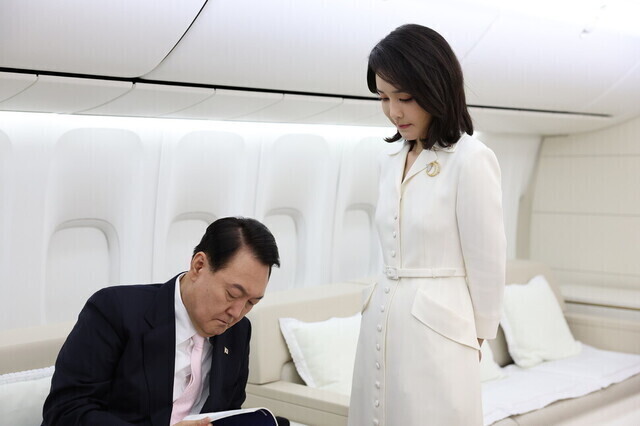
On the defensive over allegations about wife’s designer bag and push for special prosecutor
Yoon’s return to the ideological warpath appears to be related to the recent political situation.
Facing public criticism over allegations that his wife, Kim Keon-hee, had broken the law by accepting a designer bag and amid the National Assembly’s push to appoint a special prosecutor over various allegations surrounding her, Yoon installed his “avatar,” former justice minister Han Dong-hoon, as interim head of the People Power Party and put the ruling party on a war stance. Yoon also seems to be attempting to underline his willingness to embrace all-out war with the opposition party.
Han himself made a number of shocking ideological attacks in his speech upon being named interim head of the party at the end of the year.
“Since the majority party is set on preventing serious crimes from being prosecuted under the law, we must stop that party from further mischief that would wreck this country’s present and future. We must also eliminate the politics of privilege for members of the protest generation who have held sway over that party for three decades now and who attempt to bully and indoctrinate generation after generation of Koreans. We have to stop the Democratic Party under the leadership of Lee Jae-myung from ruining this country as it seeks to enrich itself in collaboration with its hardline supporters and the privileged members of the protest generation,” Han said.
Han’s remarks were bristling with spite and imprecations. His words seethed with hostility and hatred for the Democratic Party, Lee Jae-myung, and the protest generation. Opposition for those three things is a key component of the ideology that Han shares with Yoon.
What on earth is driving that kind of behavior? Why do they hate the Democratic Party, Lee Jae-myung and the protest generation? I can kind of understand why they would feel hostility for the Democratic Party and Lee Jae-myung, who after all are the opposition party and its leader.
But why do they hate the members of the protest generation, who fought in the vanguard of the democratization movement under the dictatorships of Park Chung-hee and Chun Doo-hwan? I have trouble wrapping my head around that.
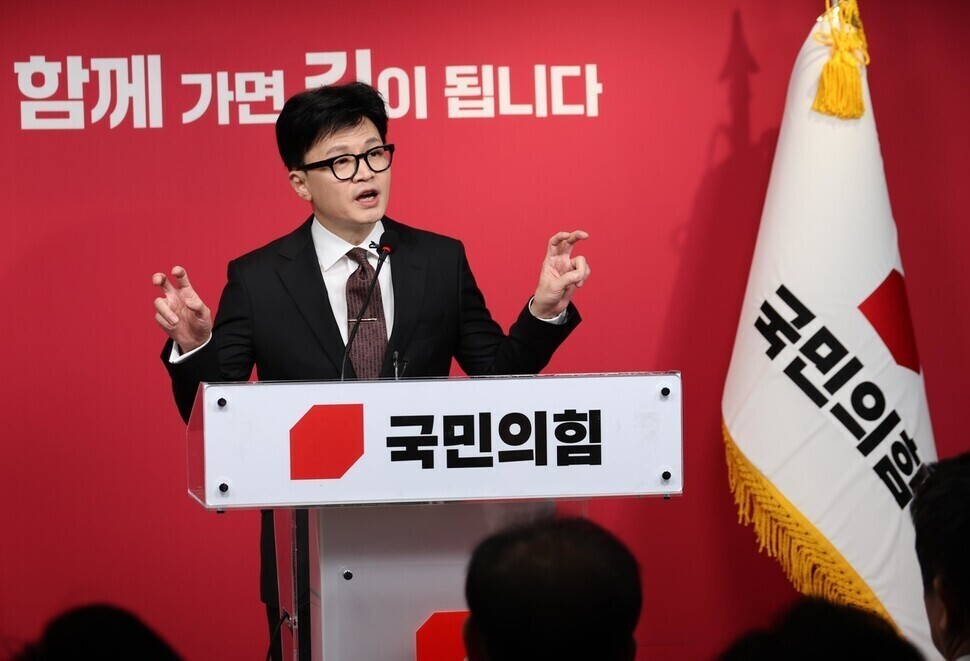
Those who studied for the bar exam while others were in the democracy protests
I think the elite of South Korea have a sort of complex about those who were part of the democratization movement. By “complex,” I refer to a bundle of emotions hidden in the unconscious.
In psychology, a complex is defined as a psychoanalytic concept signifying the presence of forces with different structures within a person’s mind.
The people who failed to fight against those in power during the era of dictatorship and authoritarianism — and the people who conspired with them — feel a sense of inadequacy and guilt toward those who were part of the activism movement. As those feelings of inadequacy and guilt come together with the sense of superiority that successful members of the elite experience, the result can be a complex.
Even commentators at so-called conservative newspapers have grown increasingly concerned about the far-right remarks from Yoon and Han. In the Jan. 1 editing of the Dong-A Ilbo, Editor-in-Chief Cheon Kwang-am published a column in which he wrote, “Rather than promoting the economy and liveliness to appeal more to moderates, Han seems to be going all in on eliminating ‘privileged former activists’ in order to shore up the support base.”
“In his speech on Dec. 26 when he accepted the position of emergency committee chair, he betrayed a coarsely combative tone toward the ‘386’ generation of former activists, using inflammatory phrases like ‘parasitic hosts,’” he noted.
He also observed that Han “has named ‘Moby Dick’ as his favorite book.”
“The book is a story about the frenzied revenge of Captain Ahab, who lost his leg to the monster whale Moby Dick. Giving everything up for the sake of his personal vengeance, Captain Ahab ends up harpooning Moby Dick in the eye — but the price he pays is the death not only of himself but of all the sailors on the Pequod (apart from the narrator),” he wrote.
Kim Hyun-ki, a rotating correspondent and general Tokyo bureau director for the JoongAng Ilbo, published a column in the Jan. 4 edition that said, “I was disappointed in the New Year’s address by President Yoon Suk-yeol on Jan. 1. Even if we take it for granted that the ruling and opposition parties are always trading blows, the president at least should be sharing some sort of vision for the Republic of Korea in 2024.”
“No matter how many times I read that address, I can’t find any substance in terms of key tasks like policies to address the low birth rate or the three major reform areas of labor, education and pensions,” he continued.
“The only phrases that linger in my mind are the references to ‘getting rid of the cartel of interest groups rooted in their own interests and ideology,’ which appeared several times,” he added.
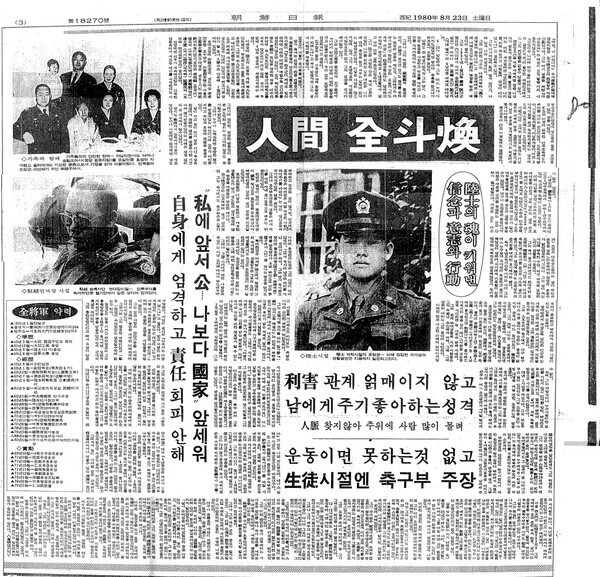
Chosun Ilbo praises Chun Doo-hwan: Why they are so critical of former activists
But Chosun Ilbo columnist Kim Dae-jung appears to have some quite different ideas. In the Jan. 2 edition, he published a column in which he wrote, “Movement politics has now lived out its life and role. Members have indulged in privileges for too long and become addicted to complacency.”
“Ignoring the progressivism and socialism that are intrinsic to the left, they have attempted simply to ride on the back of power. The prosecutors, with Yoon Suk-yeol and Han Dong-hoon at their center, have emerged as a new mainstream in South Korean politics, holding the hilts of swords to clear all that away,” he added.
“I think there is a certain historical imperative to that, just as there was when former movement activists came to power in the past. The right people to set right the former activists’ special privileges in the Republic of Korea could only be the prosecutors, with their corrective role,” he wrote.
How about that? Kim Dae-jung effectively parroted the argument used by the media that praised the arrival of Chun Doo-hwan’s new military as a “historical inevitability” back in 1980. Kim himself was the then-society desk chief who wrote a report entitled “Gwangju in anarchy” after a visit to the city a week after the events of May 18, 1980.
Kim’s article “Chun Doo-hwan the human being,” which appeared on page three of the Chosun Ilbo’s edition on Aug. 23, 1980, has often been cited as an example by people referring to the South Korean media’s darker history. It bore the following subtitles:
Convictions, commitment, and actions instilled by the KMA spirit
The nature of a giving person unconcerned about personal interests
Unwilling to seek connections draws people to him
Skilled at every form of sport, captain of soccer team as a cadet
Places ‘the public ahead of the private’ and ‘the country ahead of myself’
Strict with himself and does not shirk responsibilities
How about that? During the days of the Chun Doo-hwan regime, the Chosun Ilbo built itself up through collusion between the press and the administration. Meanwhile, the movement activists battled against Chun’s dictatorship. Can you see why it is that the Chosun Ilbo is so committed to denouncing former activists?
I’ll close by saying that I believe Yoon and Han are destined to fail if they follow the approach advocated by the Chosun Ilbo. The possibility of success will only open up if they follow the advice and suggestions of the Dong-A Ilbo and JoongAng Ilbo.
What do you think?
By Seong Han-yong, senior political writer
Please direct questions or comments to [english@hani.co.kr]

Editorial・opinion
![[Guest essay] Preventing Korean Peninsula from becoming front line of new cold war [Guest essay] Preventing Korean Peninsula from becoming front line of new cold war](https://flexible.img.hani.co.kr/flexible/normal/500/300/imgdb/original/2024/0507/7217150679227807.jpg) [Guest essay] Preventing Korean Peninsula from becoming front line of new cold war
[Guest essay] Preventing Korean Peninsula from becoming front line of new cold war![[Column] The state is back — but is it in business? [Column] The state is back — but is it in business?](https://flexible.img.hani.co.kr/flexible/normal/500/300/imgdb/original/2024/0506/8217149564092725.jpg) [Column] The state is back — but is it in business?
[Column] The state is back — but is it in business?- [Column] Life on our Trisolaris
- [Editorial] Penalties for airing allegations against Korea’s first lady endanger free press
- [Editorial] Yoon must halt procurement of SM-3 interceptor missiles
- [Guest essay] Maybe Korea’s rapid population decline is an opportunity, not a crisis
- [Column] Can Yoon steer diplomacy with Russia, China back on track?
- [Column] Season 2 of special prosecutor probe may be coming to Korea soon
- [Column] Park Geun-hye déjà vu in Yoon Suk-yeol
- [Editorial] New weight of N. Korea’s nuclear threats makes dialogue all the more urgent
Most viewed articles
- 1Behind-the-times gender change regulations leave trans Koreans in the lurch
- 2South Korean ambassador attends Putin’s inauguration as US and others boycott
- 3Yoon’s revival of civil affairs senior secretary criticized as shield against judicial scrutiny
- 4Family that exposed military cover-up of loved one’s death reflect on Marine’s death
- 5Hybe-Ador dispute shines light on pervasive issues behind K-pop’s tidy facade
- 6[Guest essay] Preventing Korean Peninsula from becoming front line of new cold war
- 7Yoon’s broken-compass diplomacy is steering Korea into serving US, Japanese interests
- 8Japan says its directives were aimed at increasing Line’s security, not pushing Naver buyout
- 91 in 10 marriages in Korea last year was with a foreign national
- 10[Editorial] New weight of N. Korea’s nuclear threats makes dialogue all the more urgent